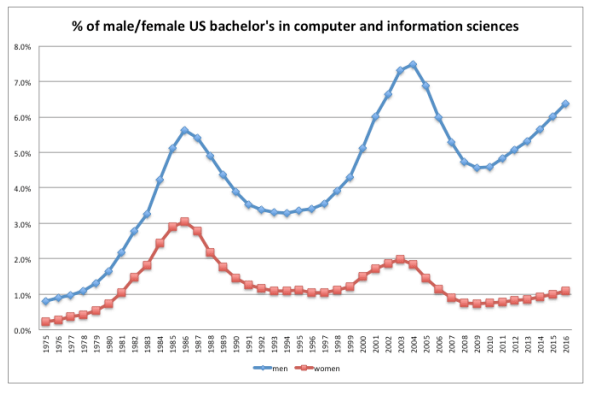Don't worry, today we are not going to talk about finances or economics as the title may suggest. We will treat a more important subject to us computer scientists. But first, let's do a quick test. If you happen to be, or you know some coders, what's the percentage from women and men? Your answer may be different, but the most probable is theres a male majority in the group. Yeah, I know, we even joke about having more than 5 women in our classes, but if you really take some time to deeply analyze and make some research about this topic, you'll find that this actually increasing year-by-year instead of going down.
At the beginning of what Computer Science is now, many women took part of this big movement. The trend was that women would take more relevance, and well, that actually happened until the mid-1980s.
10 years earlier, a study the numbers of men and women who expressed an interest in coding as a career were equal. Male were more likely to get into computer-science programs, but women’s participation increased through the late ’70s until, by 1984, 37.1 percent of all students graduating with degrees in computer and information sciences were women. In only one decade, their participation rate more than doubled.
But then things went to the other way. From 1984, the percentage dropped; by the time 2010 rolled around, it had been cut in half. Only 17.6% of the students graduating from CS and information-science programs were women.
At the beginning of what Computer Science is now, many women took part of this big movement. The trend was that women would take more relevance, and well, that actually happened until the mid-1980s.
But then things went to the other way. From 1984, the percentage dropped; by the time 2010 rolled around, it had been cut in half. Only 17.6% of the students graduating from CS and information-science programs were women.
So, what can we do? First, we already have a big push called: Women Who Code. This organization works to help engineers level up in their careers and achieve better roles in the industry. By connecting women from around the world, they are showing everyone involved that they are not alone. By taking talented women that have done amazing things, they are showing their members that success is possible for anyone, and there is no barrier they can’t overcome. And by holding thousands of training and leadership events they are preparing their members for success by giving them the tools and the experience they need to accomplish anything they set their minds to.
If you ever happen to encounter with a girl that wants to code or is interested in CS, just remember this article, and encourage her to continue and follow her dreams, because tomorrow, we will need her.



Comentarios
Publicar un comentario